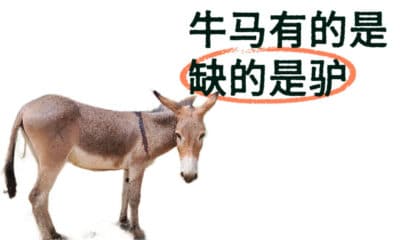China Society
How Female Comedians Are Shaping China’s Stand-Up Boom
Female comedians are taking center stage in a new era of Chinese stand-up, challenging stereotypes and turning jokes into real-life impact.
Published
2 months agoon

Nearly 40% of the lineup on China’s latest hit stand-up comedy shows is female. From ‘Director Fang’ to Wang Yue, this wave of new voices is not just funny—it’s reshaping China’s comedy scene and opening conversations once considered off-limits.
The summer of 2025 has once again put Chinese stand-up comedy in the spotlight. The second season of both iQiyi’s The King of Stand-up Comedy (喜剧之王单口季) and Tencent Video’s Stand-up Comedy and Friends (脱口秀和Ta的朋友们) sparked multiple trending topics across social media—not just for the jokes, but for who’s telling them.
This year, women account for nearly 40% of the combined lineups: 42 out of 107 comedians across both shows.
Just a decade ago, when Tonight 80s Talk Show (今晚80后脱口秀) dominated the field, there was often only one woman—Siwen (思文)—on stage. Even last year, women only made up 24% of The King of Stand-up Comedy’s debut lineup and 27% of Stand-up Comedy and Friends’.
With more women performing, audiences are hearing more stories rooted in lived experiences, touching on relationships, workplace dynamics, and everyday challenges faced by women.
The Rise of New Female Voices
One of the most talked-about breakouts is 50-year-old Fang Zhuren (房主任, literally “Director Fang”).
Her entry into the stand-up comedy world came by chance during an audience interaction. During a performance by Li Bo (李波), a talk show actress, Fang was randomly selected for an interaction with Li. Her nickname “Director Fang” stems from her spontaneous response, as she humorously introduced herself as the “director of the village information center (or the village gossip hub).”
This interaction impressed Li and eventually led her to a contract signing with Li’s talk show* club. Weibo netizens summarized this story with the label of “girls help girls” (#房主任李波girls help girls#).
[*This use of ‘talk show’ refers to the Chinese tuokou xiu 脱口秀, which usually does not refer to a Western-style talk show but (live) stand-up comedy.]

Fang Zhuren (房主任)
Fang’s debut on The King of Stand-up Comedy 2 highlighted the struggles of rural women caught between traditional expectations and harsh realities. Her act, drawing on her own life as an unhappily married rural housewife seeking independence, was even hailed online as the “talk show version” of Like a Rolling Stone (#房主任脱口秀版出走的决心#), referencing the film about China’s “road trip auntie” Su Min (苏敏), who left behind domestic life to pursue freedom.
Other female performers are also making their mark with sharp, personal perspectives:

From left to right: Wang Yue王越, Bu Jingyun (步惊云), Xiaopa (小帕).
🔹 Wang Yue (王越) often addresses the under-discussed topic of menstrual pain, a routine yet overlooked experience for many women.
🔹 Bu Jingyun (步惊云) critiques traditional chastity expectations, referencing the tragic case of a young woman driven to suicide by malicious rumors. She uses the metaphor of “a robot with foot binding going to space” to expose the absurdity of outdated moral codes in modern life.
🔹 Xiaopa (小帕), a young comedian from Xinjiang, draws humor from her turbulent family life. She portrays her father—a man who wasted savings and cycled through marriages—as a “50-year-old boy who never grew up.”
Such routines have sparked heated debates online, many extending far beyond comedy into wider social issues, particularly gender dynamics.
When the Punchline Draws a Battle Line
On July 20, Zhejiang Xuanchuan (浙江宣传), a WeChat account affiliated with the Zhejiang government, published an article titled “Beware of Talk Shows Slipping into the Quagmire of Gender Antagonism” (“谨防脱口秀滑向性别对立的泥潭“).

The controversial article
The article warned against “lazy gender gags” that pit men and women against each other, suggesting comedy should strive for “constructive offense” (建设性冒犯) rather than deepening resentment.
The article has found support among readers but also sparked a wave of retort from some netizens. Some argued that it overlooked the value of talk show actresses in exposing real-life hardships faced by women.
They questioned whether the accusation of “gender antagonism” was, in fact, masking deeper gender inequalities–some netizens argued that male comedians have long relied on sexist jokes.
Examples resurfaced online, such as top comedian Li Dan (李诞) mocking actress Liu Yan (柳岩), or comedian Chi Zi (池子) making offensive remarks about actress Wang Lin (王琳).
The timing added fuel to the fire. On the day the article was published, residents in Hangzhou’s Yuhang District were complaining of foul-smelling tap water, suspected to be sewage, yet local media like Zhejiang Xuanchuan focused on “female talk shows” over a pressing local issue.
A Weibo user wrote: “Between the choice of checking if it is algae or feces in the water pipes, Zhejiang chose to check the talk shows instead.”
Just as the backlash was cooling, veteran entrepreneur Luo Yonghao (罗永浩) reignited the debate.
As a guest on Stand-up Comedy and Friends 2, Luo reposted a review from a viewer who criticized him and host Zhang Shaogang (张绍刚), while praising well-known Chinese stand-up comedian Pang Bo (庞博) on rival show The King of Stand-up Comedy 2. Luo defended Zhang but lashed out at the reviewer, later turning his criticism toward female fan culture.
Responding to netizens, Luo argued that women’s behavior toward male idols was excessively indulgent. He further claimed that admiration for Pang Bo was largely driven by appearance, dismissing it as little more than “looks-based favoritism.”
In a lengthy follow-up post titled “A Veteran Feminist’s Last Piece of Paternalistic Advice” (“老牌女权主义者最后的“爹味儿忠告”), Luo described himself as a longtime feminist but warned against comedians “exploiting” gender issues for cheap laughs. If the industry continues down this path, he argued, it risks “industry-wide collapse.”
Beyond Gender: Comedy as Social Mirror
While topics related to gender and feminism have become a proven traffic driver, another rising theme in Chinese stand-up is comedians transforming personal struggles into humor.
One of them is Xiaopa (小帕), who has openly discussed living with bipolar disorder. By joking about her own diagnosis, she offers the audience a rare mix of vulnerability and wit.
🔹 Then there is Chen Ai (陈艾), who has lived with depression and anxiety. She dryly joked about her visit to a psychiatric hospital that “the depression and anxiety test was the only exam I ever scored high on,” while poking fun at the absurdity of psychiatric questionnaires.

Chen Ai (陈艾)
🔹 Wang Ying (王颖) brings her breast cancer experience into her comedy sets, jokingly calling it a “new comedy track” she has opened up, making breast cancer a subject of shared laughter.

Wang Ying (王颖)
Before them, physically disabled stand-up comedians were already gaining popularity in China, such as Hei Deng (黑灯), who is blind, and Xiao Jia (小佳), a rising star with cerebral palsy. Both earned recognition from netizens by telling jokes about their disabilities and the experiences that came with them.

Hei Deng (黑灯) on the left, and Xiao Jia (小佳) on the right.
These performances show how stand-up comedy can spark laughter while simultaneously addressing deeper social issues.
Some audience members, however, feel such heavy topics weigh down the art form, arguing that comedy should remain funny and light. Others argue the stage itself is a public space, reflective of society at large, where laughter is only one layer, and deeper reflection is inevitable.
But beyond reflection, these comedians can translate humor into real, practical impact.
Hei Deng once joked about strips of tactile paving made from slippery steel—meant to guide the visually impaired, it instead put them in harm’s way on rainy days. The clip went viral, and surprisingly, city officials in Shenzhen soon replaced the material and fixed the problem. A simple gag actually ended up changing public infrastructure.

Hei joked about these paves that are meant to guide visually impaired pedestrians, but actually makes them slip after the rain (source).

Fixing the slippery steel guidance for visually impaired.
The same kind of dynamic plays out when female comedians bring menstruation, cramps, or the burdens of motherhood on stage. These are not just personal stories or “women’s issues.”
When Wang Yue joked about menstrual pain on stage, show guest Guo Qilin (郭麒麟)—a well-known Chinese actor and xiangsheng (相声, or crosstalk) performer—remarked that her performance didn’t sound like a complaint, but more like a science lecture— allowing many male viewers to better understand the experience for the first time. His reaction underscores a quiet truth: when women’s experiences are silenced, men also lose the chance to understand, empathize, and adjust their behavior.

Host Chen Luyu (陈鲁豫): “Women make up half of humanity, and the female perspective is, in fact, the human perspective.”
Gender stereotypes don’t just confine women; they warp expectations for everyone. Take menstrual pain, for example. It isn’t only about the suffering women endure, but also about arguments between couples, company leave policies, and even restroom design. Likewise, son preference is not just about undervaluing women; it also places crushing pressure on young men, who are expected to buy an apartment before getting married. In other words, when women’s issues are properly addressed, everyone benefits.
As host Chen Luyu (陈鲁豫) put it, “Women make up half of humanity, and the female perspective is, in fact, the human perspective.”
Luckily, more women are stepping into the spotlight, reshaping China’s stand-up scene, and opening conversations that were once considered off-limits.
And this is just the beginning. As comedian Pang Bo observed: “They (她们, specifically women) still have a lot of issues to discuss with everyone.”
As both the iQiyi and Tencent competitions head toward their finals in early September, many wonder if a female comedian will take the crown this year?
Whatever the outcome, the stage has already changed.
By Wendy Huang
Edited by Manya Koetse
Spotted a mistake or want to add something? Please let us know in comments below or email us. Please note that your comment below will need to be manually approved if you’re a first-time poster here.
©2025 Whatsonweibo. All rights reserved. Do not reproduce our content without permission – you can contact us at
info@whatsonweibo.com
Wendy Huang is a China-based Beijing Language and Culture University graduate who currently works for a Public Relations & Media software company. She believes that, despite the many obstacles, Chinese social media sites such as Weibo can help Chinese internet users to become more informed and open-minded regarding various social issues in present-day China.

You may like
China Memes & Viral
Nanchang Crowd Confuses Fan for Knife — Man Kicked Down and Taken Away
An unfortunate misunderstanding led to one innocent man being the only person injured in a crowd of thousands.
Published
1 week agoon
October 5, 2025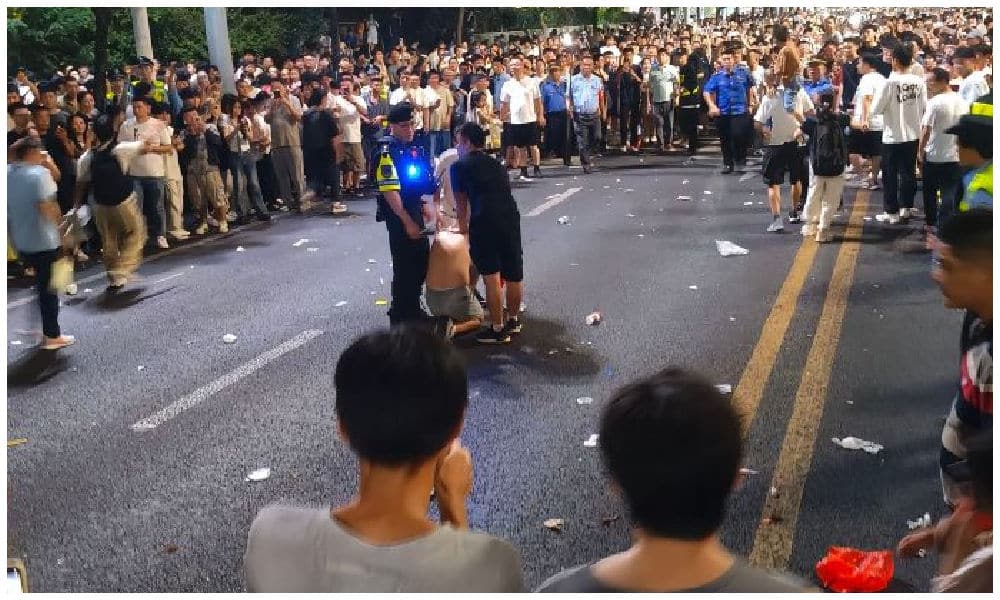
On the evening of October 1st, National Day and the start of a week-long holiday, Nanchang was celebrating with a spectacular fireworks/drone show, drawing an enormous crowd of people (see video).
But the fireworks weren’t the only thing drawing attention. One man on Nanchang’s crowded Shimao Road caught bystanders’ eyes.
He was shirtless, strongly built with a visible tattoo, and was waving a pointed object while loudly shouting something that sounded like, “I’ll kill you! I’ll kill you!”
At first, the people around him seemed unsure of what to do, keeping their distance and too afraid to approach. A large crowd formed but stayed back.
Then, a brave young man in red rushed forward and snatched the pointed object from his hand, while another young man leapt in with a flying kick that knocked him to the ground.
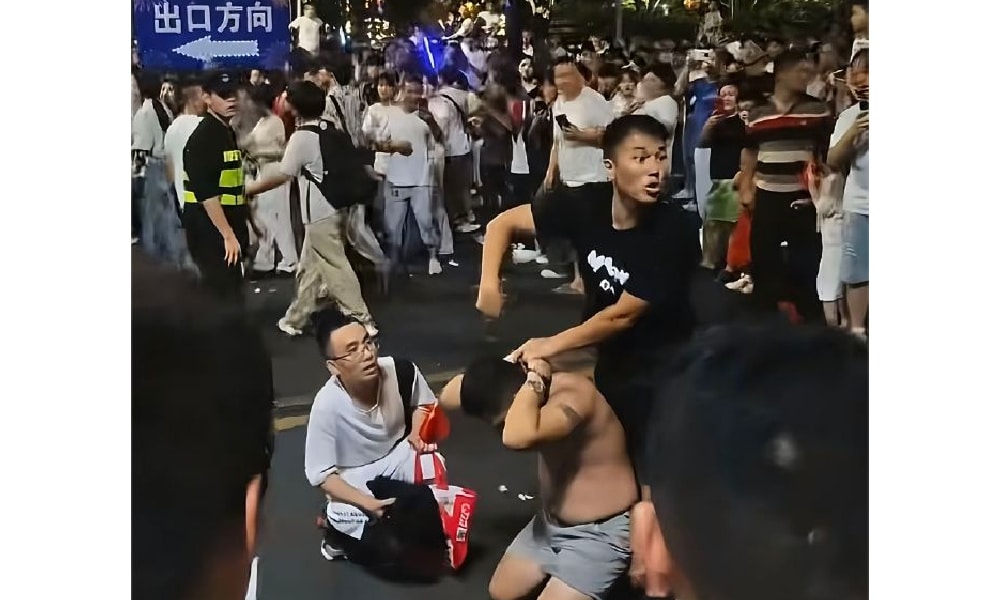
Several others then joined in, working together to restrain the man, as onlookers surrounded the scene and held him there until police arrived and took him to the station.
Soon, videos of the incident spread online (see video here), and rumors quickly surfaced that the man had been trying to attack people with a knife.

But that all turned out to be one major misunderstanding.
The next day, local police clarified what had actually happened, followed by an explanation from the man himself.
The man in question, a 31-year-old local second-hand car dealer named Li, had come to see the fireworks together with his family, including his sisters and three nephews.
Because of the very hot weather, he had taken off his shirt and was cooling himself with a 10-yuan folding fan he had just bought along the way.
After the show, while walking back, Li realized one of his nephews was missing and searched for him, calling out in his local dialect: “Where’s my kid? Where’s my kid?” (“我崽尼 我崽尼” wǒ zǎi ní).
Bystanders misheard this as “我宰你 我宰你” (wǒ zǎi nǐ, wǒ zǎi nǐ, “I’ll kill you, I’ll kill you”) and mistook his folding fan for a machete.
Meanwhile, Li couldn’t understand why people around him were avoiding him and keeping their distance from him while he was searching for his nephew (see that moment here, also see more footage here). People were watching him, and recording the scene from a distance.
Before Li realized what was happening, the fan was snatched from his hands and he was violently kicked. A crowd swarmed him, beat him, and pushed him to the ground.
The police then detained him, and it wasn’t until the early hours of October 2, after thorough questioning, that he was finally released.
“I’m still confused about it,” Li said the next day. Holding the fan up to the camera, he asked: “Can a fan like this really scare people? I don’t understand — I just got beaten for nothing.”
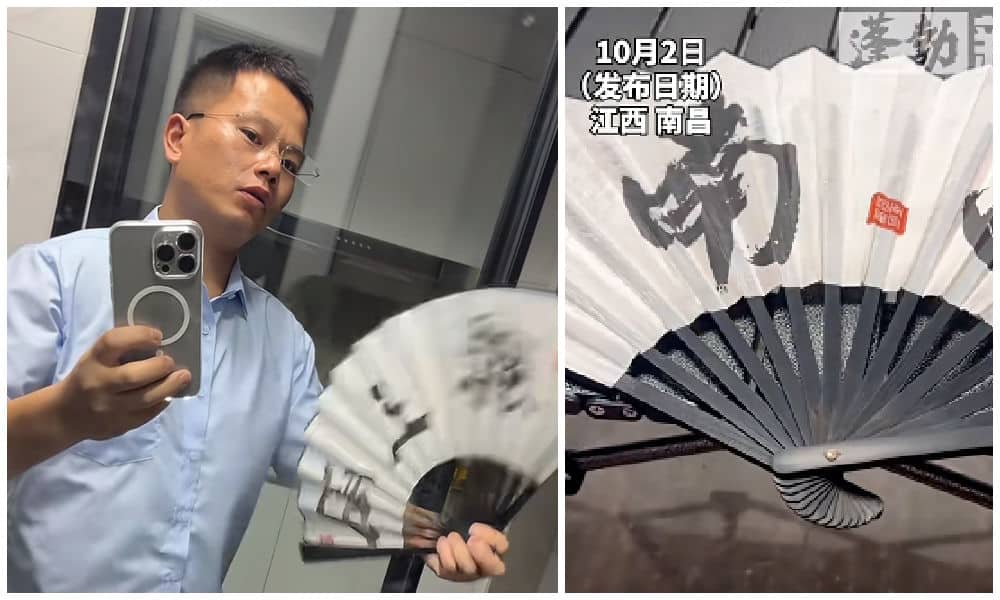
Mr Li in his video, showing the fan he bought for 10RMB/$1.4 at the Nanchang fireworks.
Some commenters remarked that out of the 1.2 million people who were out in Nanchang that night, he was the only one injured.
Li seems to be doing ok apart from a sore backside and a puzzled mind, and his nephew apparently is also safe and well.
The bizarre misunderstanding has sparked widespread banter online, with people now referring to Li as “Nanchang Brother Fan” (南昌扇子哥).
“I’m dying of laughter. It’s both tragic and hilarious,” one Douyin user wrote, while others simply called the situation “so drama” (抓马 zhuāmǎ): “I’m not supposed to laugh, but I can’t help it.”
Some also noted that they understood why people at the scene mistook Li for a criminal: “At night, a guy with tattoos, holding a long stick-like object, shouting loudly all the way, what would you think?”
All joking aside, the public’s response on such a crowded night — when so many people gathered together, potentially making a tempting target for those with bad intentions — shows a heightened sense of vigilance. Unlike the U.S., where gun violence is more common, shootings are rare in China. But random stabbings have increasingly made headlines.
For Nanchang in particular, a stabbing incident that shocked the nation had taken place only weeks earlier: a 19-year-old woman was attacked and stabbed more than ten times by a 23-year-old man she did not know, and later died from her injuries.
But there have also been other recent cases, from Wuhan to Leiyang. And in 2024 especially, a spate of stabbing incidents shocked the country. In Wuxi, Jiangsu Province, a mass stabbing left eight people dead and 17 others injured.
The positive takeaway from this entire mix-up is that the quick action of the crowd — despite their wrong assessment of the situation — shows that people weren’t afraid to step in for the sake of public safety.
But others claim the exact opposite is true. Illustrator and commentator ‘Wu Zhiru’ (吴之如), former editor at Zhenjiang Daily, saw the incident as an example of toxic herd mentality. He posted an illustration of a fan being held up with the characters 清风徐来 (qīng fēng xú lái, “a cool breeze slowly blows”), an idiom to describe a pleasant atmosphere. A finger from the right points at the fan-holder, saying “Look, he’s gonna commit violence!” (“哇,他要行凶啦!”)

Wu Zhiru warns against panic-driven mob mentality and wonders why the first man, who snatched the “knife” from Li’s hands, did not stop the crowd from attacking Li as soon as he discovered that he had snatched away a fan and not a blade. Drawing historical parallels to the Cultural Revolution, Wu argues that people are sometimes so set on doing the “heroic” thing that they hesitate to correct misunderstandings once better information is available — a mindset that can lead to serious, harmful consequences.
For Li himself, despite the unfortunate night he had, the situation has actually brought him some unexpected fame and extra attention for his second-hand car dealership, which undoubtedly makes his boss happy (in a very recent livestream, Li was praised for being kind and loyal).
Many netizens also argued that the real lesson to draw from this ordeal is the importance of speaking proper standard Chinese. Some even framed the incident as “The Importance of Mandarin” (论普通话的重要性), pointing out that the whole problem began because Li was misunderstood while speaking dialect.
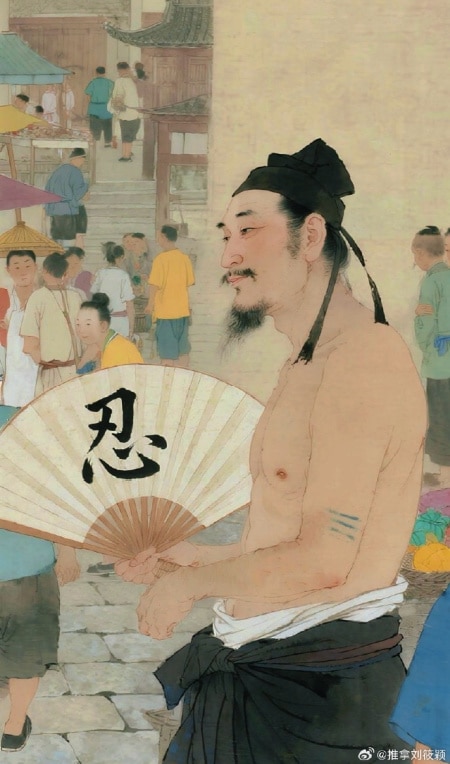
Image posted on Weibo in support of the “fan-waving brother.” The character on the fan says “tolerate.”
Others joked that the misunderstanding was just a grave injustice to shirtless men everywhere, writing: “From now on, the world has one less sincere guy who goes shirtless in the streets. He’ll never be the same again.”
By Manya Koetse
(follow on X, LinkedIn, or Instagram)
Spotted a mistake or want to add something? Please let us know in comments below or email us. First-time commenters, please be patient – we will have to manually approve your comment before it appears.
©2025 Whatsonweibo. All rights reserved. Do not reproduce our content without permission – you can contact us at info@whatsonweibo.com.
China Memes & Viral
China’s National Day Holiday Hit: Jingdezhen’s “Chicken Chop Bro”
From viral street food vendors to China’s donkey crisis and new eldercare services, here’s this week’s Weibo highlights in What’s on Weibo’s China Trend Watch.
Published
2 weeks agoon
September 30, 2025
🔥 What’s Trending in China This Week? Stay updated with China Trend Watch by What’s on Weibo — your quick overview of what’s trending on Weibo and across other Chinese social media, curated by Manya Koetse.
What’s inside:
- 1. Jingdezhen’s “Chicken Chop Bro” Becomes Nationwide Meme
- 2. China’s 2025 Golden Week Travel Trends
- 3. China Faces Donkey Shortage Crisis
- 4. Word of the Week: “Ride-hailing for Relatives” 亲属打车 Qīnshǔ Dǎchē
- 5. What’s Inside at a Glance
1. Jingdezhen’s “Chicken Chop Bro” Becomes Nationwide Meme
From Beijing to Zibo, every now and then, food stall vendors go viral — for their charm, their uniqueness, and most of all, their tasty food. The star of this moment is 48-year-old Li Junyong (李俊永), who runs a small fried chicken stall in Jingdezhen, Jiangxi Province, with tight rules on who he serves, when, and how.
Li has suddenly become one of the most trending people on Chinese social media under the nickname “Chicken Chop Brother” (鸡排哥 jīpáigē).
Li initially gained popularity among customers for his frantic, multitasking energy — he doesn’t mess around when it comes to his chicken chop business, with superspeed and a clear order of serving customers (“I’ll first do you, then finish yours, then I’ll serve you 做完你的做你的”) and rules such as: no individual customers after 4:30 PM; students pay 1 yuan (about $0.15) less than regular passersby (after 12:00 PM, however, it costs 1 yuan more as punishment for being indecisive); and customers must open the plastic bag themselves before he puts the hot chicken cutlet inside.
The serious way he goes about dealing with his chicken chops almost makes you think he was making big business deals instead of selling to middle school students. In the end, it’s that attitude that gained him social media fame, as students started referring to him as “Head of Chicken Cutlet Operations” (free translation for 鸡排主理人 Jīpái gē Zhǔlǐrén).
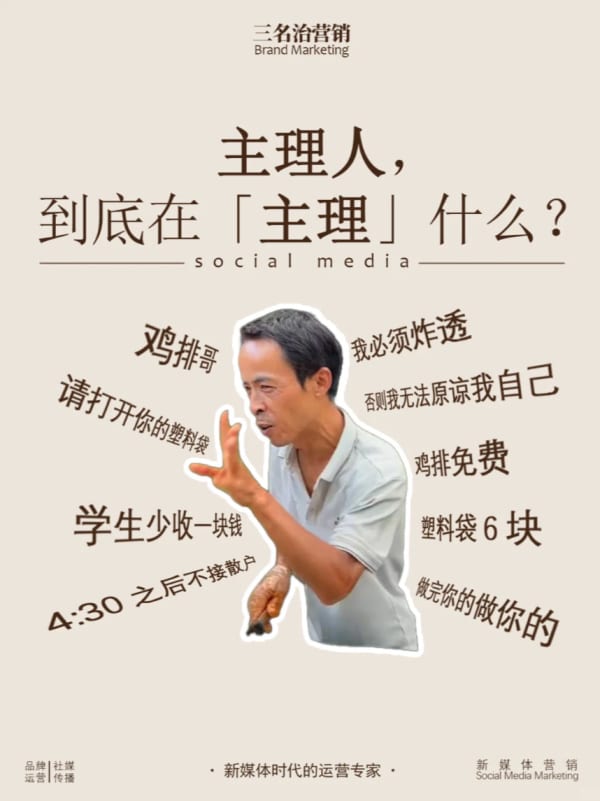
Head of Chicken Chop Operations: “Please open your plastic bag”, “No individual customers after 4:30 PM”, etc.
In light of Li’s explosive popularity, his chicken chop stall now sees extremely long queues, and local authorities and city management have had to intervene in order to control the crowds and keep the location safe.
There are definite downsides to such sudden fame, and Li is not the first street vendor this has happened to.
In 2023, for example, Beijing’s ‘Auntie Goose Legs’ (鹅腿阿姨) went viral, and the food stall owner became so overwhelmed that she temporarily had to take a break from her food stall, emotionally sharing how she said she felt too much pressure because of how the situation was unfolding, and that she just wanted to sell her goose legs in peace (“只想平平安安做烧烤”).

Long lines for Auntie’s goose legs.
It seems that “Brother Chicken Chops”, in line with his reputation as the chicken chop CEO, is trying to turn his viral moment into a sustainable business. According to Sina News, Li has drawn in relatives to help him. He reportedly has taught them how to make and sell his tasty fried chicken chops, and now his Chicken Chop Family (“鸡排家族”) has grown to a total of nine stalls.
Over the past week, Li has also joined several social media platforms, including Xiaohongshu, to build a social following that will last after the hype calms down.
Meanwhile, Li is the meme of the moment. As many Chinese workers experience working stress before the National Day holiday, they’ve used his superspeed working style videos to express the pressure they feel to finish all their deadlines. See videos here.
— What Else Is Trending —
2. China’s 2025 Golden Week Travel Trends

China’s longest holiday of 2025 is coming up, combining National Day (国庆节) and Mid-Autumn Festival (中秋节) into an eight-day Golden Week from October 1–8. If you’re traveling in China this week, good luck — the country’s transportation infrastructure is being pushed to its operational limits.
On September 30, the first “smart people” who opted to leave early to avoid traffic jams already found themselves stuck in them. China’s Ministry of Transport estimates a staggering 2.36 billion trips will be made during this period, with October 1 expected to see over 340 million travelers — surpassing the historical peak of 339 million recorded during Spring Festival earlier this year.
🔸 This week is going to see a lot of events. According to the Ministry of Culture & Tourism, more than 12,000 cultural activities will be held across China during the eight-day holiday period, including over 300 large-scale light shows.
🔸 Chinese local tourism offices are going all in on city marketing and are finding new strategies to make themselves more appealing to young travelers. Chengdu, for example, as Tencent’s gaming hub, is integrating the 10th anniversary of the super popular mobile game Honor of Kings (王者荣耀, Wángzhě Róngyào) into its cultural tourism strategy this year, organizing game-themed city walks, exhibitions, and more.
🔸 China’s travel platform Trip.com reported that interprovincial travel bookings have surged 45% year-on-year, with particularly strong interest in remote destinations like Xinjiang, Tibet, and Inner Mongolia. Searches for hotels in these regions jumped 60% compared to last year. This reflects a shift among middle-class Chinese tourists toward experiential travel and natural landscapes rather than crowded urban attractions.
🔸 The holidays are a time for relaxation, reunions, and eating mooncakes, but it’s also a stressful time for Chinese employers who must comply with labor regulations while managing workforce availability and overtime obligations. Under China’s Labor Law, employees working on statutory public holidays—October 1–3 and October 6 (the official Mid-Autumn Festival date)—must receive at least 300% of their normal daily wage. For adjusted rest days (October 4–5 and October 7–8), employers must provide either 200% overtime pay or compensatory time off. The State Council designated September 28 (Sunday) and October 11 (Saturday) as make-up workdays, but private companies have flexibility to adjust their own schedules.
3. China Faces Unprecedented Donkey Shortage Crisis

China is facing a serious donkey shortage. China’s donkey population is far below market demand, and the prices of donkey-related products continue to rise. The Donkey Branch of China’s Livestock Association (中国畜牧业协会驴业分会) addressed this issue in Chinese media earlier last week, telling China News Weekly (中国新闻周刊): “We have plenty of cattle and horses in China now — just not enough donkeys” (“目前我国牛马都不缺,就缺驴”).
4. “Ride-hailing for Relatives” 亲属打车 Qīnshǔ Dǎchē

Tencent has rolled out a new function via WeChat Mini Programs on September 26, aimed at helping seniors who struggle with app-based ride-hailing. Thanks to the new function, now live nationwide, users can order rides on behalf of older relatives directly in WeChat.
Adult children who want to help out their less tech-savvy (grand)parents or other senior relatives can now bind their account to their own, remotely pre-set pickup and drop-off locations, as well as payment methods, and track their journey for safety.
What makes this different from the possibility of just ordering a ride for someone else is that the seniors stay in control to some extent and can see their own journeys on their own phones. Children can configure settings on their side, while the interface for the elderly users is simplified. This allows seniors to ride independently, with a little help from their family.
The move is part of a broader effort in China to make it easier for seniors to stay involved in the digitalization of society.
The word to know is 亲属打车 qīnshǔ dǎchē, consisting of “亲属” qīnshǔ (relatives) and ride-hailing 打车 dǎchē.
5. What’s Trending at a Glance
- ✈️ The 27-year-old Sichuan creator “Tang Feiji” (唐飞机) died in a plane crash while livestreaming on Sept 27. The ultralight aircraft, piloted and purchased by Tang himself, went out of control and crashed before catching fire. Over 1,000 viewers were watching live, with the chat flooded by messages pleading for someone to rescue him. Local village officials confirmed his death. The tragedy is fueling debate over amateur aviation and extreme content creation.
- 🟢 Weibo has rolled out a visible “online status” feature on personal pages, showing when users are online, and not everyone is happy with it. The new feature is met with criticism from concerned users who don’t want others to see they’re online. It brings back memories of China’s legendary IM app QQ, which, like MSN, showed the online status of users.
- 🥿 A Chinese Marriott hotel location in Changzhou has come under scrutiny adn triggered hygiene concerns after guests found out that the in-room hotel slippers were being reused. The hotel has admitted to disinfected the disposable slippers and reusing them 2–3 times, without disclosing this to guests in advance.
- ⚖️ China’s cyberspace authorities issued stern warnings and announced penalties on various Chinese social platforms recently, including Xiaohongshu, Weibo, and Kuaishou, which are blamed for not keeping celebrity gossip and low-quality content in check and for influencing their hot search rankings. This is all about algorithm governance and the tightrope platforms walk in serving readers, attracting attention, and satisfying regulators.
- 👵 “Outsourced Children” services for Chinese seniors went trending recently. In Dalian, an initiative offering companionship and mediation services for seniors charges 500–2,500 yuan ($70–$350) per visit and has apparently been quite a success, underscoring strong market demand of eldercare-related services and new opportunities for Chinese students.
By Manya Koetse
(follow on X, LinkedIn, or Instagram)
Spotted a mistake or want to add something? Please let us know in comments below or email us. First-time commenters, please be patient – we will have to manually approve your comment before it appears.
©2025 Whatsonweibo. All rights reserved. Do not reproduce our content without permission – you can contact us at info@whatsonweibo.com.
Subscribe
What’s on Weibo is a reader-supported publication, run by Manya Koetse (@manyapan), offering independent analysis of social trends in China for over a decade. To receive new posts and support our work, consider becoming a paid subscriber.

Get in touch
Would you like to become a contributor, or do you have any tips or suggestions? Get in touch here!

House of Wahaha: Zong Fuli Resigns

How the “Nexperia Incident” Became a Mirror of China–Europe Tensions

China Faces Unprecedented Donkey Shortage Crisis

Nanchang Crowd Confuses Fan for Knife — Man Kicked Down and Taken Away

The Wong Kar-wai Scandal Explained: The Dark Side of ‘Blossoms Shanghai’

Hidden Cameras and Taboo Topics: The Many Layers of the “Nanjing Sister Hong” Scandal

“Jiangyou Bullying Incident”: From Online Outrage to Offline Protest

The Rising Online Movement for Smoke-Free Public Spaces in China

China Trend Watch: Pagoda Fruit Backlash, Tiananmen Parade Drill & Alipay Outage (Aug 11–12)

From Schadenfreude to Sympathy: Chinese Online Reactions to Charlie Kirk Shooting
Popular Reads
-

 China Memes & Viral3 months ago
China Memes & Viral3 months agoHidden Cameras and Taboo Topics: The Many Layers of the “Nanjing Sister Hong” Scandal
-

 China Books & Literature12 months ago
China Books & Literature12 months agoThe Price of Writing Smut: Inside China’s Crackdown on Erotic Fiction
-

 China Insight5 months ago
China Insight5 months agoUnderstanding the Dr. Xiao Medical Scandal
-

 China Memes & Viral10 months ago
China Memes & Viral10 months agoOur Picks: Top 10 Chinese Buzzwords and Phrases of 2024 Explained



